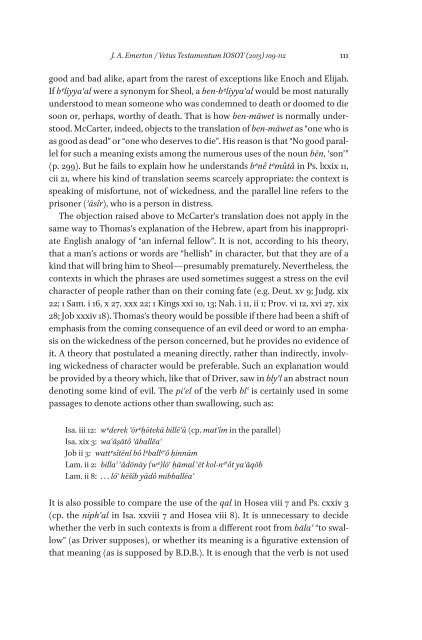Special Issue IOSOT 2013 - Books and Journals
Special Issue IOSOT 2013 - Books and Journals
Special Issue IOSOT 2013 - Books and Journals
Create successful ePaper yourself
Turn your PDF publications into a flip-book with our unique Google optimized e-Paper software.
J. A. Emerton / Vetus Testamentum <strong>IOSOT</strong> (<strong>2013</strong>) 109-112 111<br />
good <strong>and</strong> bad alike, apart from the rarest of exceptions like Enoch <strong>and</strong> Elijah.<br />
If beliyyaʿal were a synonym for Sheol, a ben-beliyyaʿal would be most naturally<br />
understood to mean someone who was condemned to death or doomed to die<br />
soon or, perhaps, worthy of death. That is how ben-māwet is normally understood.<br />
McCarter, indeed, objects to the translation of ben-māwet as “one who is<br />
as good as dead” or “one who deserves to die”. His reason is that “No good parallel<br />
for such a meaning exists among the numerous uses of the noun bēn, ‘son’ ”<br />
(p. 299). But he fails to explain how he underst<strong>and</strong>s benê temûtâ in Ps. lxxix 11,<br />
cii 21, where his kind of translation seems scarcely appropriate: the context is<br />
speaking of misfortune, not of wickedness, <strong>and</strong> the parallel line refers to the<br />
prisoner (ʾāsîr), who is a person in distress.<br />
The objection raised above to McCarter’s translation does not apply in the<br />
same way to Thomas’s explanation of the Hebrew, apart from his inappropriate<br />
English analogy of “an infernal fellow”. It is not, according to his theory,<br />
that a man’s actions or words are “hellish” in character, but that they are of a<br />
kind that will bring him to Sheol—presumably prematurely. Nevertheless, the<br />
contexts in which the phrases are used sometimes suggest a stress on the evil<br />
character of people rather than on their coming fate (e.g. Deut. xv 9; Judg. xix<br />
22; 1 Sam. i 16, x 27, xxx 22; 1 Kings xxi 10, 13; Nah. i 11, ii 1; Prov. vi 12, xvi 27, xix<br />
28; Job xxxiv 18). Thomas’s theory would be possible if there had been a shift of<br />
emphasis from the coming consequence of an evil deed or word to an emphasis<br />
on the wickedness of the person concerned, but he provides no evidence of<br />
it. A theory that postulated a meaning directly, rather than indirectly, involving<br />
wickedness of character would be preferable. Such an explanation would<br />
be provided by a theory which, like that of Driver, saw in blyʿl an abstract noun<br />
denoting some kind of evil. The piʿel of the verb blʿ is certainly used in some<br />
passages to denote actions other than swallowing, such as:<br />
Isa. iii 12: wederek ʾōreḥōtekā billēʿû (cp. matʿîm in the parallel)<br />
Isa. xix 3: waʿăṣātô ʾăballēaʿ<br />
Job ii 3: wattesîtēnî bô leballeʿô ḥinnām<br />
Lam. ii 2: billaʿ ʾădōnāy (we)lōʾ ḥāmal ʾēt kol-neʾôt yaʿăqōb<br />
Lam. ii 8: . . . lōʾ hēšîb yādô mibballēaʿ<br />
It is also possible to compare the use of the qal in Hosea viii 7 <strong>and</strong> Ps. cxxiv 3<br />
(cp. the niphʿal in Isa. xxviii 7 <strong>and</strong> Hosea viii 8). It is unnecessary to decide<br />
whether the verb in such contexts is from a different root from bālaʿ “to swallow”<br />
(as Driver supposes), or whether its meaning is a figurative extension of<br />
that meaning (as is supposed by B.D.B.). It is enough that the verb is not used








![Am HaSefer [Volk des Buches] - Books and Journals](https://img.yumpu.com/20648352/1/174x260/am-hasefer-volk-des-buches-books-and-journals.jpg?quality=85)







